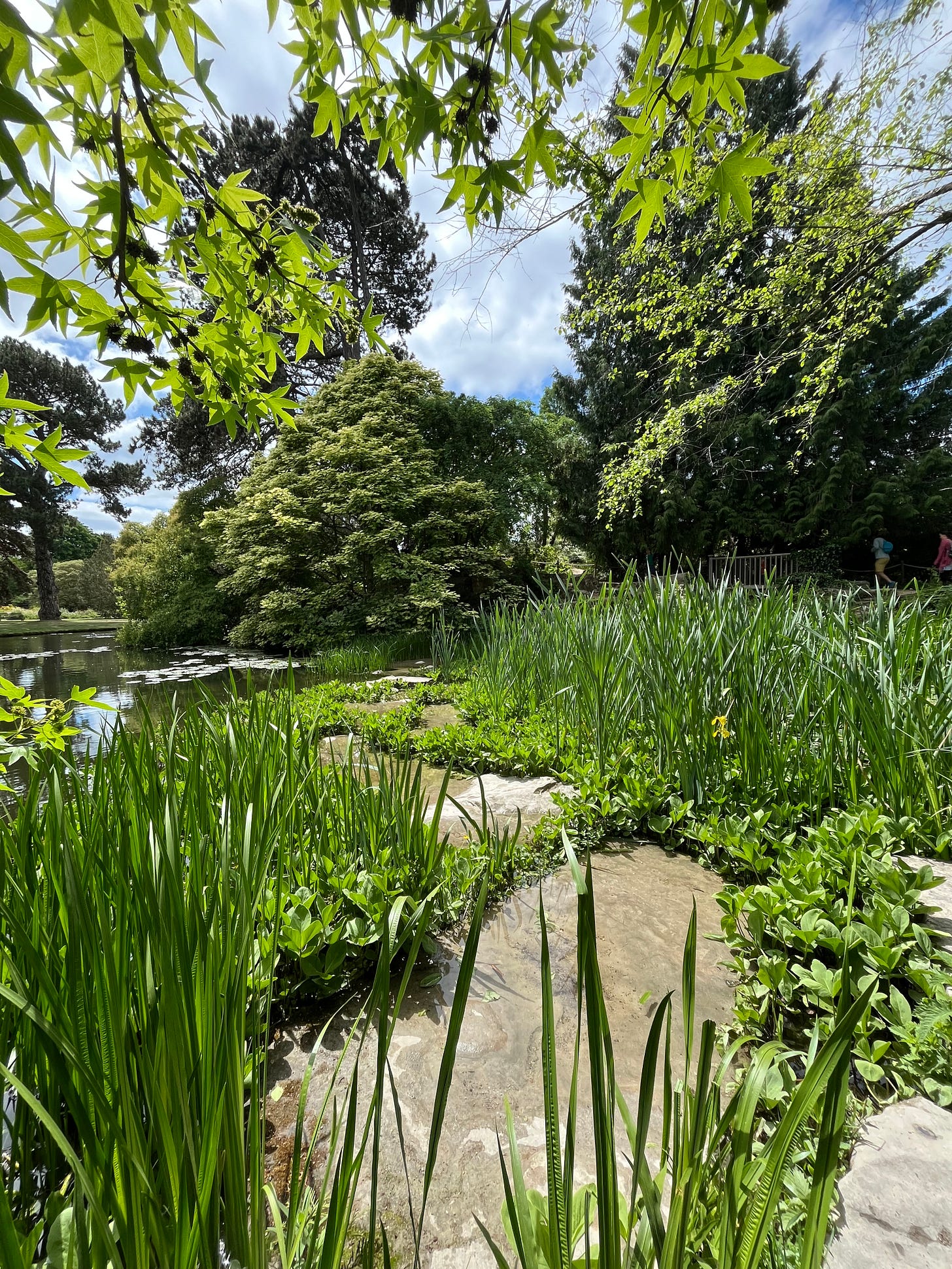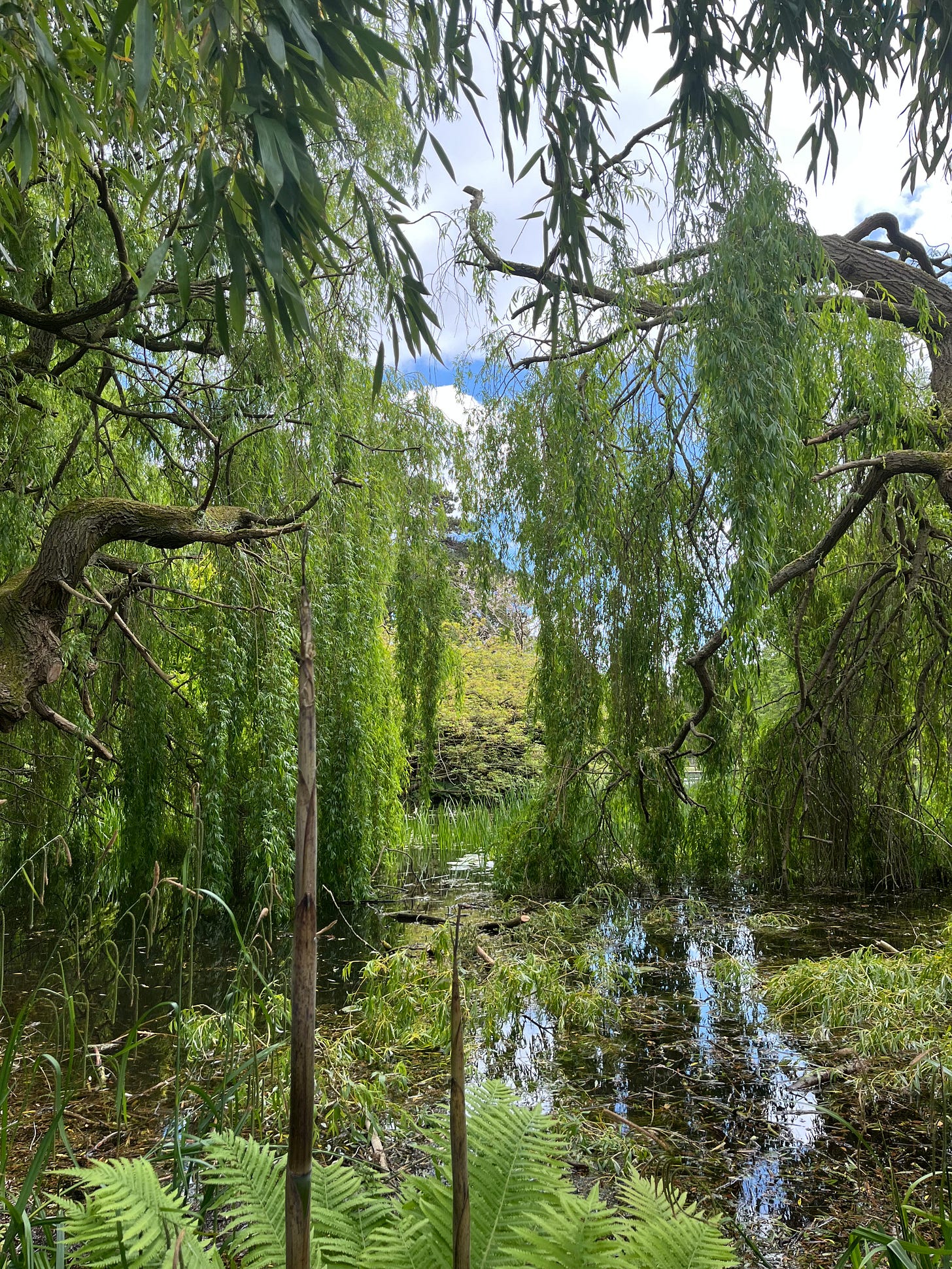Dear friends,
I’d like to start by sharing something with you that made me feel very sad.
The other day, I was wondering through the beautiful Botanic Garden in Cambridge. The gentle, soft May sunshine was dancing through the willow branches overhead, spilling into a dappled shade that glittered across the surface of the pond in front of me. I watched a moorhen staggering across the water, its comically large, yellow feet splayed like snowshoes across the lily leaves. None of this made me sad, of course.
From beneath the cover of my willow tree, I watched as two teenage girls made their way gingerly across the stepping stones that spanned a narrow part of the pond.
“This is such good lighting for photos,” one of them smiled. Naïvely, I thought she meant photos of the pond and the willow trees, but what she actually meant was photos of them, which they duly spent several minutes taking.
“This is really dangerous,” said the other, genuinely concerned. “They should have ropes across here, or a sign saying children aren’t allowed.”
The other agreed. And that was it. They moved on.
Let me be clear. I am not judging or blaming these two, maybe 15 year-olds, here. But watching this exchange made feel so sad for them. We, as adults, are letting them down.
Here was the most beautiful May day, with sunshine and life and peace and tranquility. The stuff that has inspired generations of artists, writers, musicians, heck—anyone just going about their day. And the only observations these two 21st-century teenagers had to make were how good the lighting was for photos of themselves and how dangerous was a perfectly delightful set of stepping stones across a calm, tranquil pond. This is heartbreaking.
These attitudes are a product of how we, as a society, are raising the majority of our children—in heavily urbanised environments in which the outside is dangerous. Sure, the human-made outside world might be full of danger, but in doing this, we are denying young people the chance to relish, delight and heal in the company of nature.
We are raising a generation of people who, although they understand logically that the natural world is under threat and this is bad and our fault, they do not have a rich relationship with nature underpinning their lives. It is this that truly allows a person to care, to feel in their bones that protecting nature is essential. Otherwise, biodiversity declines are merely wrong in a textbook, exam-question kind of way, not in a soul-wrenching, existential way.
Of course, I am not saying we should be scaring all young people into existential crises and anxiety attacks. No one can be creative, happy or fulfilled if they are fuelled by fear. But if they are so far from experiencing the delights that the natural world has to offer, neither will they be fuelled by the hope and determination needed to tackle the environmental crises we are handing to them as their inheritance. Nor can they sit by a pond beneath a willow tree, watching a moorhen’s silly feet, if ever they are having a bad day.
I want this for them. And I truly believe that raising children who cross stepping stones across a pond and stop to spot the dragonflies, the breeze, the blue sky overhead, delight in the joy at jumping from one rock to another, is possible, if only we wake up to how many children are not now enjoying this luxury.
Of course, I have seen plenty of children skip gleefully across these very stepping stones. I am by no means claiming it’s all doom and gloom. But we must not forget the children who rarely get brought to these natural places, who don’t feel free or safe while they’re there, who never get brought at all.
I’m sure I’m speaking to the converted here since you have either kindly already subscribed or you have clicked on this post because of its title. In any case, my plea to you all is to start this conversation with an adult in your life who might not enjoy a moorhen’s yellow feet and see if you can pull them round to our way of thinking. This can be your good deed for the week.
Let me know how you get on and whether you find that willow tree.
If you find yourself getting inspiration from this newsletter every week, subscribe for free or upgrade to paid today. It helps keep this work free for others.
Alternatively, you can…







Ever since the advent of social media, I've been concerned that children are growing up with no connection to the natural world. That connection to the natural world is one of the few things keeping me sane these days.
Hi Kate, glad to 'meet' you! And to read your lovely post. Children's connection with nature, or lack thereof, is something I feel very strongly about, for all kinds of reasons. I hope to start volunteering soon for the Sussex Wildlife Trust as a Wilder Learning assistant, helping kids to enjoy nature. Really looking forward to it! Welcome to Substack!